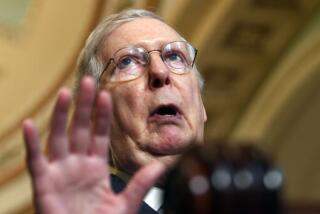WorldCom Exec Told to Drop His Questions
- Share via
WASHINGTON — WorldCom Inc. Controller David Myers tried to muzzle a fellow executive who raised questions about the company’s books with outside accounting firm Arthur Andersen, according to documents released Monday by a House subcommittee.
Myers sent a threatening e-mail to Steven Brabbs, WorldCom’s vice president for international controls in London, after Brabbs--allegedly without authorization--approached Arthur Andersen about the way in which millions of dollars in WorldCom expenses were accounted for.
“Do not have any more meetings” with Arthur Andersen, Myers wrote in a Jan. 22 e-mail to Brabbs. “I spoke to AA this morning and hear that you are still talking about asset impairments and facilities. I do not want to hear an excuse. Just stop. Don’t make me ask you again,” Myers wrote.
The e-mail was part of a series of WorldCom documents released by the House Financial Services Committee’s investigation subcommittee, which has been probing questionable accounting practices that helped drive the nation’s second-largest long-distance carrier to file for bankruptcy protection last month.
The committee is focusing on whether some WorldCom officials hid $7.18 billion in company expenses over the last several years to help the Clinton, Miss.-based company post profit instead of losses.
Myers and former WorldCom Chief Financial Officer Scott D. Sullivan were arrested Aug. 1 on federal charges that they conspired with “others known and unknown” to conceal WorldCom losses in part by wrongly listing company operating expenses as capital expenses.
Lawyers for the two men said their clients, who are free on bail but scheduled to be in court Sept. 3 when prosecutors must return an indictment, would plead not guilty.
But legal experts said Monday that the e-mail could further complicate matters for Myers.
“Statements such as [his e-mail] generally have a degree of relevance because at the minimum they impact the credibility of the individual, and at the other end of the spectrum are outright relevant to his” culpability, said Richard Hibey, a Washington criminal defense lawyer who has represented former Philippines President Ferdinand E. Marcos and former deputy CIA operations director Clair George.
Still, it is unclear whether the e-mail exchanges between Myers and Brabbs are as legally damning as they are terse. Just minutes before Myers’ e-mail demand that Brabbs not talk to Arthur Andersen, Brabbs offered to call Myers and explain “what is really happening.”
The exchange has left committee investigators unable to determine whether Myers’ complaints were triggered by genuine differences over complex accounting rules that went into effect weeks before his e-mail was sent to Brabbs, or whether Myers was seeking to prevent Brabbs from disclosing the questionable expense shifting that is at the heart of the WorldCom financial scandal.
The documents released by the committee also include an e-mail to Brabbs from Tilesh Patel of WorldCom’s British office that indicates that WorldCom had to review Arthur Andersen’s determinations about WorldCom’s treatment of write-downs before restating any costs.
In his e-mail, Patel said there were differences of “opinion” concerning the writing down of assets, and a review of Andersen’s proposals couldn’t be completed “within the next few days.”
There is no indication from the documents about how the matter was ultimately resolved.
“We have not found any specific action taken against Steven Brabbs” for going to Arthur Andersen, said Peggy Peterson, a spokeswoman for House Financial Services Committee Chairman Michael G. Oxley (R-Ohio).
But “the e-mails show the opposition and the intimidation that Brabbs encountered when he raised questions,” Peterson said.
Brabbs couldn’t be reached for comment.
WorldCom spokeswoman Julie Moore said her company was “continuing to cooperate with all investigative bodies and will continue to do so until there is a full resolution.”
The January incident is the second reported clash between Myers and Brabbs over WorldCom’s bookkeeping.
In April 2000, Myers also chided Brabbs after the executive raised questions about WorldCom classifying more than $33 million in operating costs as capital costs.
The e-mails “give you an inside view of the internal workings at WorldCom, which look to be pretty tough,” Peterson said.
The committee requested the e-mails as part of its ongoing investigation of WorldCom, which besides operating long-distance giant MCI owns communications wires that carry about half of all Internet traffic.
The Justice Department, the New York attorney general’s office and the Securities and Exchange Commission, which has charged WorldCom with fraud, also are scrutinizing the company and its executives.
WorldCom filed for the biggest bankruptcy in history in July, about a month after the company acknowledged it had hidden $3.9 billion of its expenses.
This month, the company found an additional $3.3 billion in overstated earnings, bringing the total to $7.18 billion.
WorldCom, once one of the fastest-growing telecommunications companies in the world with operations in 65 countries, now says it lost money in 2000 and 2001.





